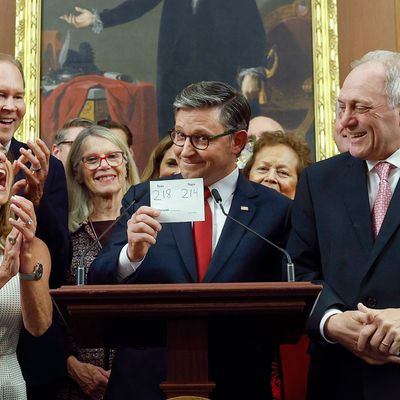

House Speaker Mike Johnson holds up the final vote total on the One Big Beautiful Bill on July 3.
Photo: Kevin Dietsch/Getty Images
You might think that Republicans would be satisfied with the massive cuts to social-safety-net programs in Donald Trump’s One Big Beautiful Act. Unfortunately, they’re already looking at ways to reduce funding for various benefits that weren’t impacted by the megabill that was signed into law last week.
Not all safety-net benefits and services are in the sort of entitlement programs that can be cut via budget-reconciliation measures. The Urban Institute defines five non-entitlement programs as part of the social-safety net: “the Special Supplemental Nutrition Program for Women, Infants, and Children (WIC); Temporary Assistance for Needy Families (TANF); child-care subsidies supported by the Child Care and Development Fund (CCDF); the Low Income Home Energy Assistance Program (LIHEAP); and public and subsidized housing.” These require annual appropriations by Congress and thus could be subject to cuts in the appropriations bills for the fiscal year beginning in October, which are just now making their way through Congress. There’s no question congressional Republicans want to cut this kind of spending some more, and it’s possible fiscal hawks were promised that would happen in order to secure their votes for Trump’s megabill. But appropriations, unlike reconciliation bills, can be filibustered in the Senate, so Democrats do have some leverage over them.
What cannot be filibustered, however, are clawbacks of current-year appropriations initiated under the so-called rescission process. These cancellations of previously appropriated funds can be proposed by any administration subject to approval by both houses of Congress within 45 days. Trump’s budget director, the wily Christian nationalist Russell Vought, has already sent over a small ($9.3 billion) rescission package to ratify some of the first DOGE cuts (mostly involving foreign aid and public broadcasting); the House has approved it, and the Senate has until July 18 to do so, though it could amend the package. More importantly, Vought could propose many more rescissions or even “jam” Congress by exercising the president’s right to defer appropriations just before the end of the fiscal year, leaving no time for the action to be overturned by Congress. On top of everything else, Vought has always claimed that Trump has the right to unilaterally impound appropriations, which means just canceling them outright. All these weapons could threaten safety-net appropriations in the months and years ahead.
Safety-net entitlement programs won’t necessarily escape further cuts, either. The very day Trump signed his megabill, House Speaker Mike Johnson told Fox News two more such measures are on tap before the 2026 midterms:
“The reconciliation bill today was a big, giant leap forward. But we’re going to do this again. We’re gonna have a second reconciliation package in the fall and a third in the spring of next year,” Johnson said on Fox News’ “The Ingraham Angle” on Thursday — without going into specifics.
Although the speaker didn’t disclose details, the next two reconciliation bills are likely to revolve around additional tax priorities, as well as spending cuts that Republicans are after but weren’t able to get done in the megabill. The reconciliation bills might also include technical fixes to the One Big Beautiful Bill Act.
The Congressional Budget Act limits Congress to one budget resolution per fiscal year, setting up one or two reconciliation bills. But the current fiscal year ends on October 1 and, yes, in theory congressional Republicans could pass two more reconciliation bills. That’s what they did in 2017 when Trump’s tax cuts were enacted late in the year. Again, it’s possible Johnson privately assured his House Freedom Caucus faction he’d go after Medicaid, Medicare, or even Social Security before calendar year 2025 ends; there’s probably nothing he wouldn’t have promised to nail down those last two or three votes for the Big Beautiful Bill. Whether there’s an appetite for that sort of drastic action in the Trump White House or the non-fanatical elements of the congressional GOP is another thing altogether.
If Democrats want to put a stop to the shredding of the safety net, they had better flip the House in the midterms and take away reconciliation as a weapon for the rest of Trump’s term in office. If they don’t, Republicans will come after these programs again and again.
Source link






